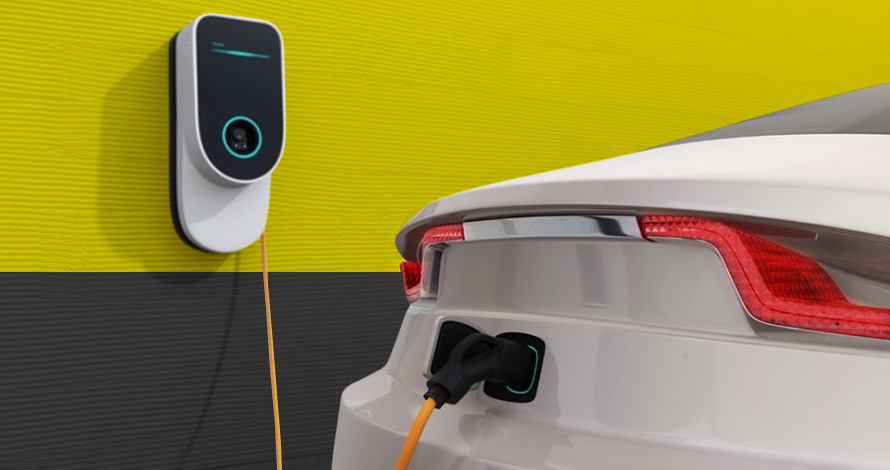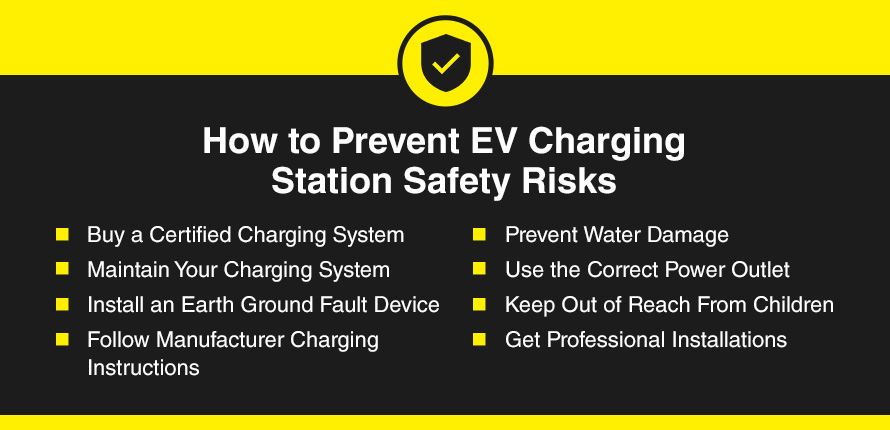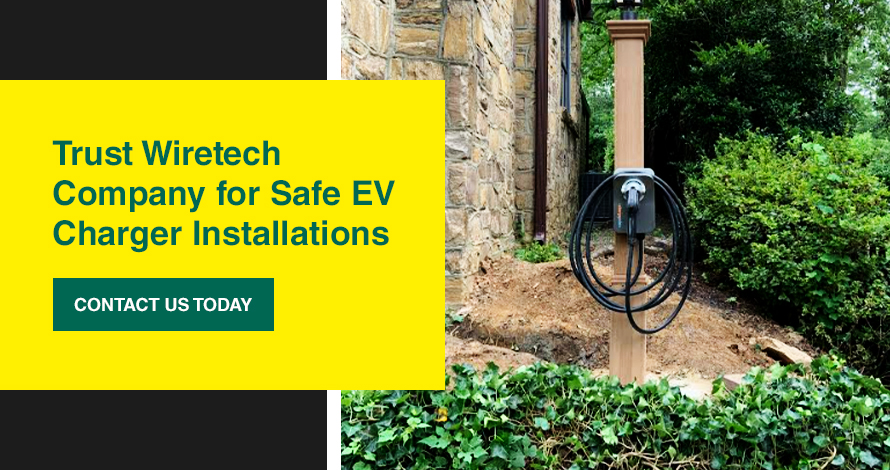
As a homeowner, you want to ensure your family and home are safe from electrical faults and danger. Installing your electric vehicle (EV) charging station correctly is vital for maintaining that safety. Understanding how to avoid electrical hazards with EV charges can help protect your family and home.
Fire Hazards With EV Chargers
While fire is an EV charger safety concern, it is preventable with proper charging safety measures. Like other electrical appliances, installing high-quality EV charging equipment is essential. With suitable wiring and power supply, you can prevent fire hazards. Buying a certified charging station can also ensure your charger is safe. Some common fire hazards with EV chargers are outdated wiring and absent or faulty residual safety devices.
Outdated Electrical Wiring
One of the most significant fire hazards with EV charging is outdated or incompatible wiring. Charging your electric car can require high electrical voltages. When installing your charger, your power supply must support charging demands. Traditional wiring may be unable to handle the higher voltages that are necessary for powering your charger.
An inadequate power supply can strain your charging station and cause an electrical circuit overload. Eventually, your charging station will overheat, harming your charging device and wiring. The excess heat can cause an electrical fire and pose a safety hazard. If your home has older wiring, getting a professional to install a new or compatible circuit board is essential.
Residual Current Device Fault
Installing a residual current device (RCD) on your charging point is essential. An RCD is an electrical safety component. It monitors electrical currents and can switch off electricity immediately when it detects a fault or unusual activity. For example, if a person touches an electrical component, the RCD detects the unintentional current flow and cuts the power supply, preventing electrocution, fires, and other harm.
If a residual current device is improperly installed, it might not work as intended, causing electrical faults and fires. RCDs that are faulty, damaged, or worn can also be a fire hazard. Getting a qualified electrician to install and inspect your RCD is vital. They can identify faults and provide safe and reliable installations.
Home Fire Safety Precautions With Charging Stations
EV charging equipment has various safety components — like temperature controls — that can prevent electrical faults and other safety hazards. Charging stations also get certified based on their safety level. Fire associations inspect EV charging stations, ensuring they are safe for installation. Electrical inspections and certifications are the best ways to verify your charging station is safe and hazard-free. Charging protections like that of a cable box can also provide additional safety precautions against hazards.
Inspection Certifications
EV charging stations undergo numerous inspections like electrical compliance and safety tests. Electrical associations test charging stations for various safety requirements like in-rush control, temperature control, electrical shock vibration, protection and exposure.
By looking for various lab testing certifications, you can verify your charger’s safety and functionality levels. EV chargers that are safe for use undergo extensive testing before you can buy them. You can check the charger packaging and production information for site certifications. Qualified electricians can also help you verify safety and quality certifications.
Protection Components
Components like negative temperature coefficient (NTC) thermistors, earth monitors and battery management systems offer protection against overheating, faults, and fires when charging your electric car. Your electrician can confirm these components when installing your EV charger:
- NTC thermistors: Chargers can have NTC thermistors at their cords that protect against in-rush currents when charging your EV.
- Electrical ground monitor: A ground monitor is a safety device that detects current levels. It ensures a high current flow with ground or earth instead of an alternative source. If a ground monitor detects unusual current flow, it immediately trips or interrupts the electrical current.
- In-cable control box: An in-cable control box is a safety unit that controls voltage from the charger outlet to an electric vehicle. It can manage various voltage flows, providing a safe connection or power supply between an EV and charging stations.
- Battery management system: Charging stations have a battery management system (BMS) that helps detect unusual charging operations. It regulates charging levels to prevent overheating, making it safe to leave your EV plugged in. For example, if you leave your EV plugged into your charging system overnight, the BMS will decrease charging when your EV is almost fully charged.

How to Prevent EV Charging Station Safety Risks
While EV charging stations can have many safety precautions, practicing good safety is vital when charging EVs. Using your charging system correctly prevents safety risks like shock and other accidents. Maintenance and professional installation are also essential for mitigating safety hazards.
Buy a Certified Charging System
Charging system design can impact your safety. If your charging station does not have suitable safety certifications, it can pose a risk to you and your family. Ensure that you buy a charger from a trustworthy and reputable brand. Checking the product for national testing and safety accreditations is also essential.
Maintain Your Charging System
Wear can compromise your charging station safety. Using suitable maintenance practices can help prevent wear and safety hazards like shocking. Check your manual for accurate maintenance instructions. You can also speak to your electrician for maintenance advice.
Install an Earth Ground Fault Device
Installing an electrical safety unit like an earth ground fault device with your charging station can help avoid accidents like shocking. A professional electrician can help you install and inspect your ground-fault device and ensure it works.
Follow Manufacturer Charging Instructions
Different charging stations can have unique operational guidelines. Check your charging station manual for instructions and best practices for using your device. Following your manufacturer’s charging instructions can ensure you and your family’s safety.
Prevent Water Damage
While some charging stations can be waterproof, getting water on your charging outlet could be a shock hazard and can cause damage. Check for safe water usage information in your product and manual, and limit water exposure as a precaution.
Use the Correct Power Outlet
EV charging stations may require distinctive power outlets. Ensure you use a compatible power outlet to avoid electrical surges and damage.
Keep Out of Reach From Children
While EV stations are safe, they provide high-voltage currents that cause harm without proper guidance. Like most electrical devices, keeping your EV charging station in a secure location and far from children can prove accidents like shocking.
Get Professional Installations
Getting a certified electrician to install your charging station is one of the best ways to prevent safety risks. Electricians are trained to install a new circuit and power supply safely. They can also ensure that your charging stations have all the appropriate safety measures and are safe for use.

Trust Wiretech Company for Safe EV Charger Installations
After a professional installation, your EV charger can be safe and reliable. Unsafe installations can compromise your home’s power supply and your family’s well-being. Who are you going to trust to install your EV charging station?
At Wiretech Company, we offer safe and trustworthy EV charger installations. Our technicians are highly qualified and knowledgeable in electrical compliance. We install multiple charging stations and understand the precautions needed when installing a unit.
We offer 24/7 electrical services and repair and can help maintain your charging unit. We also provide exceptional customer service and can walk you through the installation and maintenance requirements.
Contact us to learn more and schedule your installation today!
